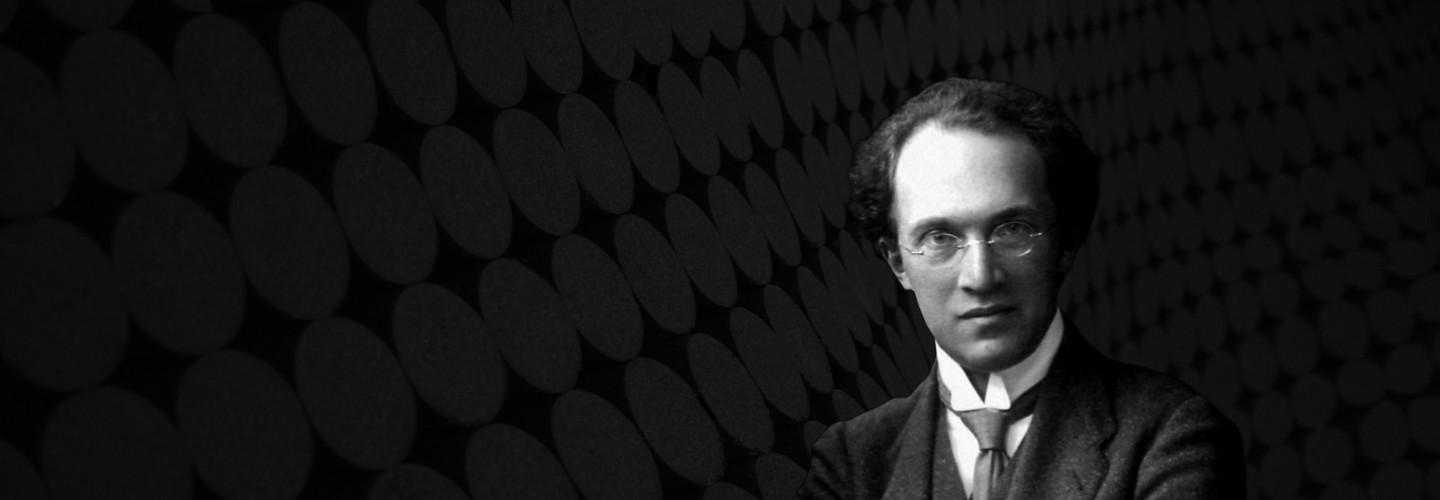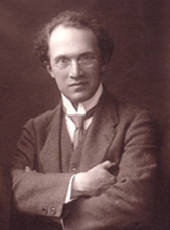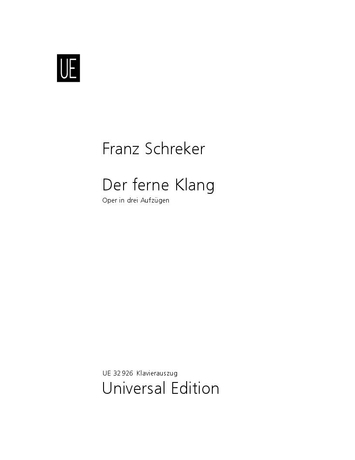

Franz Schreker
Der ferne Klang
Short instrumentation: 3 3 3 3 - 4 3 3 1 - timp(2), perc(3), glock, hp(2), cel, str - behind the scene: Venetian music (fl, cl, 2 hn, timp, tamb, hp, 3 mand, 2 guit, str.quin), on the stage: Gipsy music (cl, cimb, str.quin), behind the scene: pno
Duration: 140'
Libretto von: Franz Schreker
Klavierauszug von: Ferdinand Rebay, Alban Berg
Dedication: Herrn k.k. Hofopernkapellmeister Bruno Walter in Dankbarkeit zugeeignet.
Choir: SATB
Roles:
Der alte Graumann
bass
Seine Frau
mezzo-soprano
Grete
soprano
Fritz
tenor
Der Wirt
bass
Ein Schmierenschauspieler
baritone
Dr. Vigelius
high bass
Ein altes Weib
mezzo-soprano or high alto
Greta
soprano
Mizi
soprano
Milli
mezzo-soprano
Mary soprano
Eine Spanierin
alto
Der Graf
baritone
Der Baron
bass
Der Chevalier
tenor
Rudolf
high bass or baritone
Erster Chorist
tenor
Zweiter Chorist
bass
Die Kellnerin
mezzo-soprano
Ein zweifelhaftes Individuum
tenor
Ein Polizeimann
bass
Ein Diener
speaking part
Gäste / Kellner / Kellnerinnen / Gesinde des Gasthauses / Mädchen / Tänzerinnen aller Nationen / Männer und Frauen
zum Teil maskiert / Theaterpersonal / Theaterbesucher / Wagenausrufer
Instrumentation details:
1st flute
2nd flute (+picc)
3rd flute (+picc)
1st oboe
2nd oboe
3rd oboe (+c.a)
1st clarinet in A (+cl(Bb))
2nd clarinet in A (+cl(Bb))
bass clarinet in Bb (+cl(Eb))
1st bassoon
2nd bassoon
contrabassoon
1st horn in F
2nd horn in F
3rd horn in F
4th horn in F
1st trumpet in C
2nd trumpet in C
3rd trumpet in C (+bass tpt)
1st trombone
2nd trombone
3rd trombone
bass tuba (+cb.tuba)
timpani
1st percussion
2nd percussion
3rd percussion
glockenspiel
1st harp
2nd harp
celesta
violin I
violin II
viola
violoncello
contrabass
venetian music (cont.aind the scene): flute
clarinet in A (+cl(Bb))
1st horn in F
2nd horn in F
timpani
tambourine
harp
1st mandolin
2nd mandolin
3rd mandolin
1st guitar
2nd guitar
1st violin
2nd violin
viola
violoncello
contrabass
gypsy music (on the stage): clarinet in D (+cl(Eb))
cimbalom
1st violin
2nd violin
viola
violoncello
contrabass
piano (cont.aind the scene)
Schreker - Der ferne Klang
Sample pages
Audio preview
Video
Work introduction
It was Der ferne Klang, following its premiere in Frankfurt Opera House on 18 August 1912, that established Schreker as one of the most widely performed operatic composers in Germany. 20 years later, he was branded a degenerate. In the libretto that he had written himself for his drama about the failure of love and the decline of an artist, Schreker packaged together everything that was de rigueur at the time: fin de siècle artistic themes, Freud’s discovery of the unconscious and the naturalist poetry of misery. Schreker’s sound universe is characterised by stylistic diversity, with extensive use being made of instruments such as the harp, celesta and piano. With singular virtuosity, he brings together a wide cross-section of sound sources, fusing the standard orchestra with gypsy music and Venetian music played from various distances from the stage and adding a distant chorus as well. The unbelievable magic of Schreker’s orchestral sound is not easily forgotten.
The storyline for Schreker’s opera covers a period of 15 years. The opera takes place in Germany and Venice circa 1900. Young composer Fritz leaves his Grete, no longer able to stand the petit bourgeois confines of his surroundings and feeling that he is destined for greater things. His plan is to return when he is famous and offer her riches, celebrity and his undying love. Grete is gambled away by her alcoholic father to a landlord and goes on the run. At the end of her tether, she is taken up by a matchmaker and agrees to follow her. After some time, Fritz – driven by a yearning for Grete – finds her again in the dance salon “La Casa di Maschere”, where she is now a courtesan called Greta. Fritz calls her a harlot and leaves again. Greta succumbs to the advances of a Count who had been wooing her for a long time in vain. Five years later, Fritz succeeds in having his opera “The Harp” premiered in a court theatre. Grete, who has since been abandoned by the Count and is now a common streetwalker called Tini, was at the performance. However, when she recognises herself in the main protagonist, she feels faint. The premiere turns into a fiasco. Grete learns that Fritz is terminally ill. The two of them meet again. However, their new-found happiness together comes too late: Fritz finds his mysterious “distant sound”, the mirage of which he has been chasing all his life, while dying in the arms of his long-lost love, Grete.


